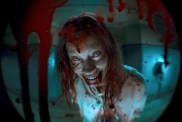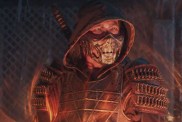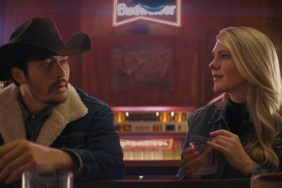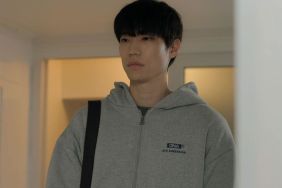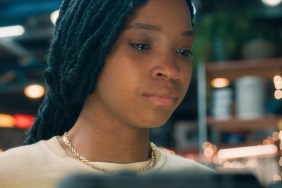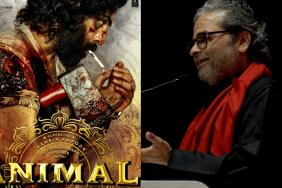For his new film Breaking and Entering, Oscar-winning writer/director Anthony Minghella (The English Patient, The Talented Mr. Ripley) decided to forego the sweeping epic scope of his previous productions and focus on the drama that develops when a teenage burglar steals a laptop computer from the office of a successful London architect named Will (Jude Law). As the story progresses, the young thief becomes fascinated by the family life documented in the laptop, and when Will becomes determined to track down the stolen property he winds up in an affair with the boy’s mother Amira (Juliet Binoche).
Recently, Minghella and Binoche, who are working together for the second time after “English Patient,” sat down in New York to discuss the issues at play in this new piece.
CS: Where did the impetus for this film come from?
Anthony Minghella: After having a decade of making movies that were adaptations of novels I think that inevitably when you come to make a movie that is an original film you can’t do anything other than reflect the world that is going on around you. When I was making “Cold Mountain” I have a very vivid memory of standing on a hill and thinking “I need to go home and make a movie that has no research, which is simply about the world I live in and the place I live. It’ll be very fresh, very quick, very rough and ready
” and I’ve never done so much research as I did for this movie. Every line we had some expert patrolled and disagreed with and quarreled with. We had analysts, teachers, psychiatrists, free running experts, Bosnians, Serbs, I went to Romania, I went to Sarajevo, I went everywhere. It was extraordinary how little I knew and how little I got right about the world I thought I inhabited.
CS: One of the big conflicts in the film is Jude Law and Robin Wright Penn’s characters trying to cope with an autistic daughter. What was your aim in detailing this problem?
Minghella: I was having a conversation at lunch with somebody who’s got a special child and they were saying that the problem with that special child was getting a proper diagnosis. One of the things the studio kept asking me and often preview audiences kept saying is “what is wrong with this girl?” I kept saying if you knew what was wrong with her you’d be able to fix things, but the problem with some of these wiring issues is that they’re not easy to diagnose. You keep looking for relief from the diagnoses. One of the things Robin’s character says is “we’ve been to so many people, we’ve never had a proper diagnosis”. I’m not even sure if this is a child on the autism spectrum, that’s the conjecture, but the idea simply was to show two special children and show the extent a parent will go to protect their turf, to protect their child.
CS: What sort of research did you do for your character, a Bosnian immigrant transplanted into London?
Juliet Binoche: My first instinct was to go to Sarajevo and meet with women to understand what they went through before and during the war, meeting mothers who had been through the whole ‘going out’ experience. It was very traumatic for them, ’cause being inside was hard enough, but going out was even worse. Arriving to see whether it was Paris or London. It’s still a struggle, and ten years after it’s still a struggle, so it’s like they’re sacrificing their life for their children to make life better in maybe a few generations. As an actor it’s always a transformation journey, because first of all you have to come without knowing, trying to empty yourself in order to receive. Of course there was the accent issue, but that became more of a tool. I was in contact with a Bosnian woman all the time in London and she made my life much easier, it was a way to reach the rhythm and the love of the language. Even though it was not a documentary but it has to have some kind of reality that was thoughtful and intimate. So that was my search mainly. It was about how do I survive in this world and then all of the sudden meeting this amazing love and destroying it. So that was mainly my journey.

CS: Was making a much more intimate, small-scale drama a return to your roots as a filmmaker?
Minghella: I loved the fact that making this movie there were not many people working on it on a daily basis. While I was making “Cold Mountain” there was one day where there were more than two-thousand people on the set, and it’s very hard to keep your focus. I never intended to do any adaptations, it just sort of happened. I felt it was very urgent that I go back to something to which on some level I belonged. It was good to do something contemporary and also modest, in every sense. Lower budget. It was a very different experience and one I liked a lot.
CS: The film shows people from different, almost opposite social backgrounds crossing over into each other’s worlds. For example Juliet’s son, the burglar, is very envious of the upper-middle-class architect’s life he sees in Jude Law’s stolen computer. What do you think draws Law’s character into the more impoverished world of Juliet’s character and her son?
Binoche: When he sees that she has this world of herself, like the imagination piano playing, it’s like he’s discovering “My God, these people have their lives!” It’s not just a seamstress with no life struggling all day. They have their world and they come from a very specific place. So he’s rediscovering it as he’s discovering it. Am I answering this right?
Minghella: I think that you’re answering it perfectly because one of the things we were trying to do is create a world in which these three people, Robin and Jude and their daughter, were living where all the life was drained out of everything. It was designed to death. There’s not a single color anywhere. This woman is waking up in the morning and needing to find an artificial light. Everything has lost its blood. And then he arrives in a place where it’s so full-on and real and simple and I think he feels oddly more comfortable in that tiny little room than in the very special gorgeous place he’s made for himself in Primrose Hill, which if you know London you know is extremely high end. One of the things that’s very true of London is within 100 yards you can come across extremely polarized experience people have. One house is a five-million-dollar house then there’s a project
it’s bizarre, and I think it’s part of this strange difficulty we have of knowing how to live with each other. We’re experiencing the exact same geography with a different set of values. I didn’t find it odd that he was attracted to Juliet. I think there’s a moment when that window smashes at the beginning of the movie and then everybody starts looking at each other as opposed to not looking at each other. It’s like so you can see out the window, and also see inside. One of the first things that happened when I came to London and I’ll never forget it cause it was like a life lesson. I was a young playwright and I couldn’t afford to be in London so I slept on someone’s couch for a year. I would get up once I knew the cleaner would come. I’d be writing at the desk and the cleaner would come in. After two or three weeks of her weekly visit I said hello to her and she was a very shy cleaner. And I said “where do you come from?” and she said “I’m from Beunos Aires,” and I said “oh, that’s interesting
why did you come to London?” She said “I’m a psychiatrist. I was exiled. I came because
” and I suddenly felt so humiliated that I just thought “oh, there’s the cleaner coming in.” It was very odd to me ’cause I come from a very monochrome culture where everyone is who they appeared to be, and suddenly I realized I knew nothing about anything. As Juliet was saying you think “that person’s a refugee and that’s all they are,” but actually the minute you go another inch further you realize they’re extraordinary. Particularly in Britain, and maybe in America right now, we’re very suspicious of immigration. We think that they come to take something from us, but a lot of them come ’cause they have to. Nobody wants to leave their homes, they leave them for a reason, they come with stories. Before you make a judgment of somebody, find out what their story is. Part of what happens with Jude’s character is he thinks he’s demonized this burglar and then he discovers that the burglar, for good or bad, is the most innocent person in the story.
Breaking and Entering, now playing in New York, opens in limited theaters on February 9.
